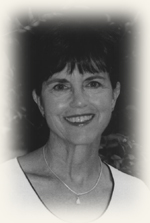Presentations: Anne Webster
A Different Kind of Home

As a young adult, when I thought of home, it wasn’t a place that came to mind, but my Grandmother Carroll. While I was growing up, she stood fast, a lighthouse in the sea of Mother’s depression, Uncle John’s schizophrenia, my teenage sister’s divorce, and the financial disasters of assorted aunts and uncles.
Grandmother ruled over the rambling yellow frame farmhouse and the circling outbuildings—smoke house, hen house, milking barn, and garage—with seemingly endless energy. With the help of a black couple who lived in a cabin a few hundred yards from the house, she gardened, cleaned, kept up the property with its fruit trees and few head of livestock, and tended to her second husband, blind and twenty years her senior. I can still see her in a sun bonnet picking vegetables from the garden to cook for dinner, churning butter on the back porch, leading Grandfather to the bathroom or table. She never once said, as her grandchildren often do, “I’m so tired,” even after cooking dinner for thirty or forty of her family.
When one of her or any of “Mr. Carroll’s” children from his previous marriage had problems, Grandmother, her mouth set in a determined line, did whatever it took to set them right. Sometimes she offered financial help; other times she made room for them to live with her until the storm passed, as she did when my young sister left her abusive husband and brought a toddler to live in the farmhouse.
Mother and I moved in after Mother, at forty, succumbed to debilitating depression. Grandmother took Mother for Electroconvulsive Therapy treatments, and helped me stand suicide watch when she brought Mother home, crying and babbling after the jolts of current to her brain. When her doctors recommended that Mother have a lobotomy, Grandmother said, “Not my child, you won’t!” Instead, she sent Mother away to Ohio to her younger sister’s to see a new psychiatrist and to have more ECT.
Mother and Daddy had divorced a few years earlier because alcoholism had taken over his life, so with both of them out of commission as parents, I would have been left on my own at fifteen had it not been for Grandmother. During the next two years, as Mother gradually recovered enough to go back to work, Grandmother fed me wonderful meals, sewed the latest fashions for me to wear, and vetted the boys I dated.
Unlike most people today, she knew with certainty what was “right” and never wavered, wondering as we do, if extenuating circumstances demand a lowering of standards. Her Baptist faith provided her with rules for living from which she never strayed. Not once did I ever hear her repeat gossip or use sarcasm to put someone in his or her place. My world with her and her clearly proscribed values was safe, and though she never kissed or hugged, I knew without a doubt that I was loved.
When Grandfather died, Grandmother left the farmhouse for a smaller home in town, and years later, in her early eighties, moved into a retirement apartment. During those years I had only to visit her, to stretch out on the same sofa that I’d sprawled on to watch TV as a teenager, to feel utter peace.
When nearing ninety, her failing eyesight and memory made it necessary for her to move into a nursing home, and our roles reversed. She became a fussy child when I visited, and she begged to go home with me. It was my turn to do what was best for her, and though I couldn’t convince her that she would be miserable in my multi-storied house, alone when I was at work, she never failed to ask, “Don’t you love me? Why can’t I live with you?” leaving guilt to nag me during the drive home.
When she died at ninety-three, I looked at the gaunt face in the coffin and knew that my world had lost one of its anchors. But Grandmother’s strength and deeply rooted values remained. They had become the ideal against which I measure the world—and my actions. Her voice, saying, “Do what’s right,” still rings clear. And for many years she remained the home my mind traveled to in times of stress, until decades of marriage to a man, as firm in his beliefs as Grandmother, provided me with another safe haven.